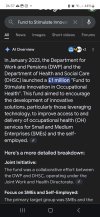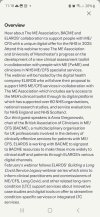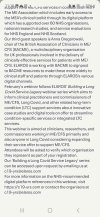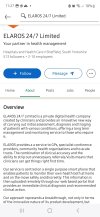Does anyone have a link for ELAROS' specific ME involvement being part funded by the DWP? Thanks.
One link -
'Press release'
£1.5 Million investment to improve in-work health services as part of government drive to tackle inactivity
- Recognising the need for transformative changes in the OH market, the DWP/DHSC Joint Work and Health Directorate launched the dedicated ‘Fund to Stimulate Innovation in Occupational Health’ in January 2023 to stimulate innovation and improve service delivery models through the effective use of technology.
- Wellics Ltd, Kinseed Limited, Elaros 24/7 Limited, Latus Health Ltd and Armour Labs Ltd are all participating in the latest stage of the Innovation Fund.
Reforms to occupational health services will be shaped through a £1.5m innovation fund, through Innovate UK's Small Business Research Initiative (SBRI), as the government continues its drive to tackle in work sickness and boost economic activity using new technology and artificial intelligence.

www.gov.uk
.
Wow. This is the modern equivalent of investing in rain dancers instead of water infrastructure to deal with chronic droughts. It has zero chance of achieving any of what they claim to, absolutely ridiculous nonsense. It may look like they're saving a bundle, but they're actually spending money to make the problem even more expensive and harmful.
And while they're admitting it's largely due to Long Covid, they're straight up lying about it, there is zero evidence supporting this, nothing but assertions that completely ignore reality:
Before the pandemic, inactivity in the UK had fallen by over 850,000 and while it currently remains lower than G7, EU and OECD averages, many people including those from younger generations are out of work due to long term sickness, in large part been driven by mental health conditions like depression and anxiety.
I mentioned yesterday the concept of a
Glonzo issue, when uninformed fools sometimes recognize the impact of a problem, say, drought, but completely misattribute its cause and solution, such as needing people to perform rain dances to appease the gods, because the drought can only be happening because the gods are angry.
This is a total Glonzo issue. They recognize the problem, but attribute it to some alternative nonsense. There is zero difference between this and people who complain about more frequent heat waves, caused by climate change, but attribute it to weather modification using laser satellites, or whatever. It's also the same thing as people who looked at the COVID pandemic deaths, and decided that, yes, those people died, but they died because of the vaccines, not the virus.
It's the same thing, different prongs of the same political horseshoe, where the extremes may have a different angle, but converge on the same nonsense. On one side, the conspiracy fantasy crowds. On the other, the, medical profession? That can't be right. But it is.
They are straight up lying about this, those lies are supported by the medical bodies and public health authorities. And spending money based on lies. Excused by more lies. Lies and corruption every-freaking-where.









